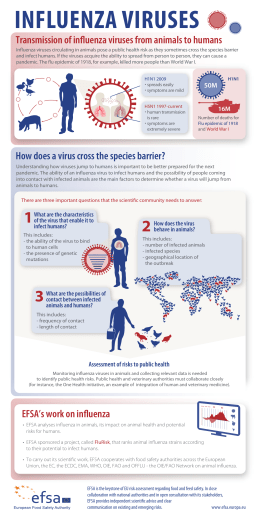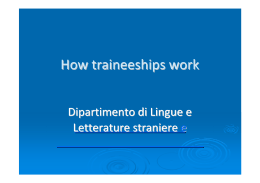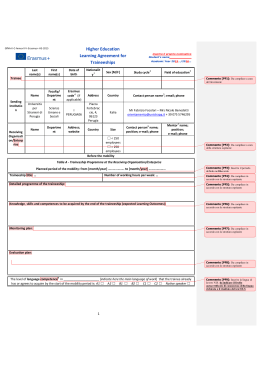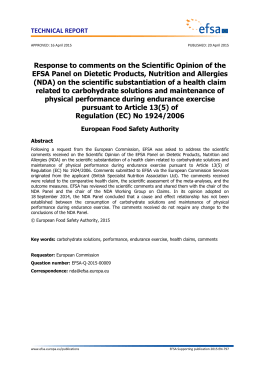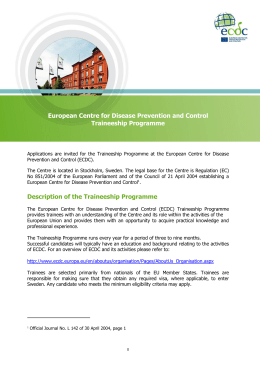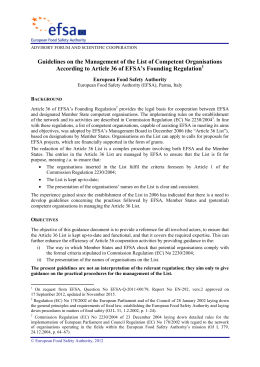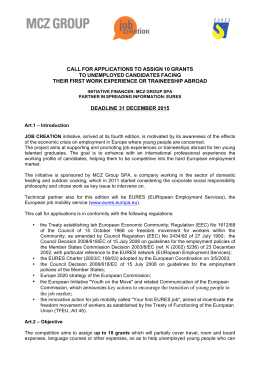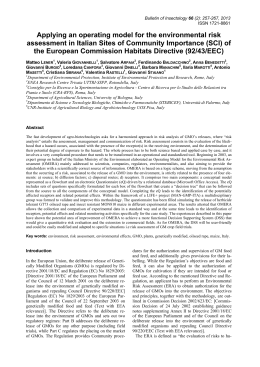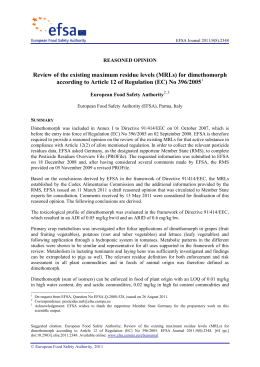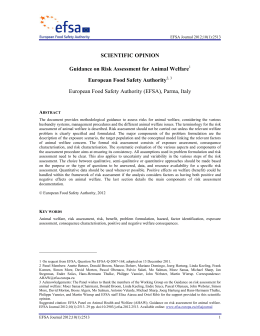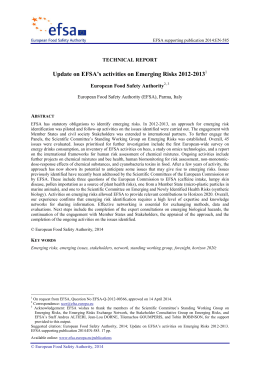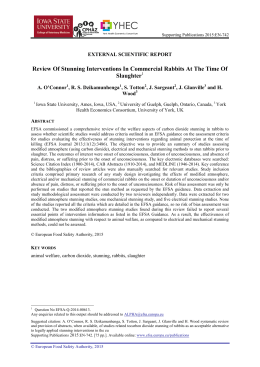Decision EFSA/HUCAP/DEC/148/2013 concerning traineeship at EFSA Effective Date: 01/01/2014 Supersedes: Decision dated 10/01/2013 Approvals Signature Name Lead Author Signature on file Laurence Caratini Reviewer Signature on file Alessia Vecchio Acting Executive Director Signature on file Bernhard Url Internal use Introduction In the framework of continuous improvement and evolving challenges to be faced to for the organisation, the current ED decision of 10/01/13 on the acceptance of trainees for an in-service training has been assessed as need to be revised Description New Decision of the Executive Director on the traineeship and short-term study visit schemes at EFSA References Relevant standards, legislation and documents Alignment to the European Commission’s decision on traineeship [C(2005)458)] Benchmarking with sister EU Agencies’ rules governing the traineeship (EMA, ECDC, ECHA) Article 26 of the Regulation (EC) No 178/2002 of the European Parliament and of the Council of 28 January 2002 Abbreviations and definitions HUCAP Human Capital and Knowledge Management Unit HoU Head of Unit Decision History Date Revision Description of Change No. 01/01/2014 1 Streamline and rationalisation of the procedure 2 Introduction of the concept of Short-term study visit 3 Formalisation of the “Europass” traineeship European Food Safety Authority – Via Carlo Magno 1/A I-43126 Parma Tel: (+39) 0521 036 111 • Fax: (+39) 0521 036 110 • www.efsa.europa.eu EXECUTIVE DIRECTOR Decision of the Executive Director of the European Food Safety Authority on the traineeship and short-term study visit schemes at EFSA THE EXECUTIVE DIRECTOR HAVING REGARD to the Regulation (EC) No. 178/2002 of 28 January 2002 of the European Parliament and the Council laying down the general principles of food law, establishing the European Food Safety Authority (EFSA) and laying down procedures in matters of food safety1, and in particular to Articles 26(2) (a) and (g) and Article 48 thereof, regarding the role of the Executive Director of the European Food Safety Authority2, HAVING REGARD to the budget of the Authority and the funds available for the traineeship scheme, HAVING REGARD to the office space available for the short-term study visit scheme, WHEREAS it is necessary to draw up rules to govern traineeship and short-term study visit organised by EFSA. HAS DECIDED AS FOLLOWS: TITLE 1 TRAINEESHIP SCHEME General EFSA offers the opportunity for traineeship which is mainly addressed to young university graduates, without excluding those who – in the framework of further professional education – have recently obtained a university diploma and are at the beginning of a new professional career. The aims of the EFSA traineeship scheme are: To provide an understanding and practical experience of the objectives of EFSA’s role and work in the food safety area, 1 OJ L 31, 1.2.2002, p. 1. 2 In the present Decision also referred to as “the Authority” or “EFSA”. 2 To facilitate the entry into professional life and to promote the professional development of suitably qualified people in fields related to the work of EFSA. Through its traineeship scheme, EFSA: Benefits from the input of enthusiastic young graduates and professionals, who can give a fresh point of view and up-to-date academic knowledge, which will enhance the everyday work of the Authority, Creates a pool of people with first-hand experience of EFSA and its working methods, which will be better prepared to collaborate with EFSA in the future. Article 1 Eligibility 1.1 Candidates are selected from nationals of the Member States of the European Union, from EEA EFTA 3 and of candidates’ countries benefiting from a preaccession strategy4. However, a number of nationals of non-Member States are also accepted according to available resources, if justified. 1.2 Candidates must have completed the first cycle of a higher education course (university education) and obtained a full degree or its equivalent5 by the closing date for applications. 1.3 Candidates must have the linguistic competence necessary to fully participate in the work of EFSA. As the official predominant language of EFSA is English, applicants must have a good working knowledge of this language6. Knowledge of other European languages is an asset. 1.4 Traineeship will not be offered to applicants who have already been an EFSA trainee, who have ever been employed by EFSA in any capacity, who have worked for EFSA as an interim staff or intra-muros expert for more than six weeks. Candidates should inform EFSA of any change in their situation that might occur at any stage of the application process. Article 2 Status Admission to a traineeship shall not in any way imply that trainees are permanently or temporarily employed by EFSA. It shall not entail any right or priority with regard to appointment or recruitment by EFSA. Article 3 Duration of traineeship 3 4 European Economic Area – European Free Trade Association: http://www.efta.int/about-efta http://ec.europa.eu/enlargement/policy/glossary/terms/preaccession-strategy_en.htm 5 For minimum national qualifications required by the legislation in the country where the diploma was obtained, see Annex I. 6 B2 level as minimum level accordingly to the Common European Framework of Reference for Languages (CEFR): http://europass.cedefop.europa.eu/en/resources/european-language-levels-cefr 3 Traineeship shall start either on the 1st May or on the 1st October of each year. Traineeship shall last a minimum of six (6) months and a maximum of twelve (12) months. Training periods may not be repeated or extended beyond the maximum length or beyond the end of the traineeship period. The traineeship finishes automatically at the end of the given period. Article 4 Selection procedure 4.1 EFSA makes its selection of trainees on the basis of the applications received with due regard to an appropriate balance of nationality and gender. Successful candidates will typically have a background relating to the activities of EFSA (i.e. Food Safety, Toxicology, Microbiology, Sciences, Statistics and/or Modelling, Scientific Risk Assessment, etc). Qualified candidates with an interest in any support function (i.e. Information technologies, on-and offline communications, legal affairs, human resources, budget, accounts, infrastructure services, document management, project management, etc) are much welcomed too. 4.2 Any candidate who meets the eligibility criteria referred to in Article 1 may apply. Candidates are requested to submit their application by downloading the form and by following the instructions as described on the EFSA Website: http://www.efsa.europa.eu/en/jobs/traineeship.htm Applications after the closing date will be rejected automatically. 4.3 Eligible candidates selected by the service (Unit or Team) in the database, will be required to undergo a telephone or on line interview to discuss reciprocal expectations and to check availability prior to the final decision. In line with Articles 11 and 11a of the Staff Regulations 7 and EFSA’s Policy on Independence8, candidates will be required to complete a Declaration with reference to relatives employed by EFSA and a Declaration of Interest (DOI) which will be assessed by the Head of the Human Capital & Knowledge Management Unit. 4.4 The Executive Director will make the final decision on the basis of a proposal submitted by the service hosting the trainee. This proposal shall specify the tasks to which the trainee will be assigned and the Advisor responsible during the traineeship. 4.5 Successful candidates will receive the offering letter by e-mail stating the starting date and duration of the traineeship, as well as a copy of these rules and any relevant information. They will be required to sign the traineeship offer and to provide documents which prove that the eligibility requirements are met. 4.6 If an application is unsuccessful, a candidate may re-apply for a subsequent training period. It is, however, necessary to submit a fresh application as EFSA does not keep applicant’s files from one in-take to another. The keeping of files by EFSA respects Regulation (EC) No. 45/2001 of the European Parliament and of the Council of 18 December 2000 on the protection of individuals with regard to the processing of personal data9. 7 http://ec.europa.eu/civil_service/docs/toc100_en.pdf 8 http://www.efsa.europa.eu/en/topics/topic/independence.htm 9 Official Journal of the European Communities, L8 of 12 January 2001. A detailed data protection statement is available on the EFSA Website. 4 Article 5 The traineeship contract When entering EFSA on first day the trainee shall sign the original traineeship contract and the Declaration concerning confidentiality, personal data protection and independence. The trainee shall provide documents of his/her identity, education, proof of sickness insurance and criminal record not older than six (6) months. Article 6 Rights and Obligations of trainees 6.1 Trainees are placed under the responsibility of an Adviser. Each Adviser may be responsible for only one (1) trainee per training period. The adviser must supervise, guide and closely follow the trainee in his/her work. At the end of the traineeship, the trainee shall submit to his/her Advisor the selfassessment part of the evaluation report on the work/activities during the traineeship. The Advisor shall complete the evaluation part and send this report to the Human Capital & Knowledge Management Unit. Only the trainee is provided with a certificate specifying the length of the traineeship and the Unit or Team to which he/she was assigned. 6.2 Trainees shall be required to comply with the instructions given by the manager of the Unit or Team to which they are assigned. They shall also comply with these rules and the internal rules governing the functioning of EFSA, in particular the rules concerning working conditions, security, safety, conflict of interest and confidentiality. 6.3 Trainees must maintain confidentiality about all facts and information which come to their knowledge during the in-service traineeship. They must not in any manner whatsoever disclose to any unauthorised person any document or information not already made public. Trainees must not in particular publish or have published, either on their own initiative or in collaboration with others, any document concerning the activities of the EFSA and relating to confidential facts or information without written permission from the Executive Director. They must comply with these obligations even after completion of the traineeship10. 6.4 Trainees must not have any professional connections with third parties which might be incompatible with carrying out their tasks during the traineeship at EFSA. In accordance to EFSA’s Policy on Independence, if at any time during the traineeship, a trainee becomes aware of any potential of likely conflict of interest, he/she must immediately inform his/her Advisor or other Manager who will determine any appropriate action. 6.5 Trainees must respect the same rules for contacts with the Press as other EFSA staff and follow the instructions provided. 6.6 Trainees may participate in EFSA internal trainings which are in line with the objectives of the traineeship and which are relevant for the tasks to which they have been assigned. Trainees may also participate in Unit or Team’s event (e.g. Away Day) upon agreement of the Manager. Languages training shall not be available for trainees. 10 For the time period equivalent to the length of the traineeship. 5 Article 7 Absences Trainees shall keep the same hours of work and have the same official public holidays as EFSA staff. Trainees are entitled to two (2) days leave per month. This entitlement is acquired pro rata of the months worked counted from the first day of the month. Days of leave not taken are not paid in lieu. Leave are managed under the same conditions that apply to EFSA staff. Article 8 Grants Trainees shall be awarded a monthly maintenance grant. The amount of the grant is decided by the Executive Director on a yearly basis and is dependant on budgetary constraints. The amount of the basic grant is published annually on the EFSA website. Trainees receiving a grant from another source shall not be entitled to a maintenance grant from EFSA, unless the amount they receive is less than the maintenance grant, in which case they shall receive an amount that will bring their income up to the level of the maintenance grant. Article 9 Travel expenses at the beginning and end of the traineeship EFSA shall pay a travel allowance to compensate for the expenses incurred from the place of residence to the seat of EFSA and vice versa at the beginning and at the end of the in-service training period. The reimbursement shall take place where the distance between the place of residence, as stated in the application form of the trainee, and EFSA, based on the table below: Distance between the place of origin and EFSA Contribution for the one way trip in Euros 0 to 200 KM 201 to 500 Km 501 to 1000 Km 1001 to 2000 Km 2001 to 3000 Km Over 3001 Km 0 75 125 175 225 250 Distance means the distance (one way) between the two locations as calculated by the website www.viamichelin.com to consider the recommended route. The contribution shall cover the one way trip between the place of residence/departure and EFSA. Should the place of residence differ from the place of departure the shortest distance to EFSA shall apply. Excess baggage shall be covered up to € 200 (two-hundred), on production of proof of the expenditure incurred. The postal address used in EFSA’s letter awarding the traineeship shall be considered to be the place of residence. No request of address change shall be granted once the decision to award a traineeship has been taken. 6 Article 10 Missions In exceptional cases only, the Executive Director may, on a motivated request from the Manager concerned grant authorisation for a trainee to be sent on mission. This authorisation entitles trainees to reimbursement of mission expenses in accordance with EFSA rules. Article 11 Sickness and accident insurance EFSA does not cover sickness insurance and trainees must provide proof that they are covered by a sickness insurance scheme for the entire duration of the traineeship at the Authority (for nationals of the Member States, this means the form E 111 or a document showing that the trainee is covered by private insurance). During the traineeship, trainee is only personally insured against the risk of accidents according to the EFSA insurance policy. Article 12 Tax arrangements Grants awarded to trainees are not subject to the special tax regulations applying to officials and other servants of the European Communities. Trainees are solely responsible for the payment of any taxes due on EFSA grants by virtue of the laws in force in the State concerned in which they are liable to pay income tax. The Human Capital & Knowledge Management Unit will provide a certificate for tax purposes at the end of the traineeship period. This certificate should state the amount of grant received and confirm that tax and social security payments have not been made. Article 13 Interruption of traineeship and sanctions 13.1 Under exceptional circumstances, at the written request of the trainee stating the relevant reasons, the Head of the Human Capital & Knowledge Management unit may, after consultation of the concerned Manager, authorise an interruption of the traineeship for a given period. The grant is then suspended and the trainee is not entitled to reimbursement of any travel expenses during that period. The trainee may return to complete the unfinished part of the training, but only up to the end of the same training period. No extension is possible. 13.2 If a trainee wishes to terminate his/her traineeship earlier than the date specified in the contract, a written request must be submitted by the trainee to the Head of the Human Capital & Knowledge Management Unit, copy the concerned Manager, for approval. This request, stating the relevant reasons, must be submitted at least three (3) weeks in advance of the new termination date foreseen. Where appropriate, the trainee shall reimburse the equivalent part of the grant to EFSA. 7 13.3 The Authority reserves the right to terminate the traineeship at any time if the conduct or performance of the trainee does not prove satisfactory, if the trainee breaches his/her obligations under these rules, if the trainee has provided false statements or papers at the moment of application or during the traineeship period, if it becomes apparent that the trainee knowingly made wrongful declarations or if the trainee does not comply with EFSA’s rules concerning working conditions, security, safety, conflict of interest and confidentiality. The traineeship maybe terminated by the Executive Director, following a justified request by the concerned Manager approved by the Head of Human Capital & Knowledge Management Unit. The trainee shall reimburse any overpayment of the grant to EFSA and the trainee shall not be entitled to receive travel allowance. TITLE 2 SHORT-TERM STUDY VISIT SCHEME EFSA offers the opportunity of undertaking a short-term study visit to young university graduates who have recently obtained their diplomas, to those who in the framework of further professional education have recently obtained a university diploma, and to students as part of compulsory course at a university or equivalent institution. The objectives of such study visit are: To allow the beneficiaries to complete a concrete project (research or other project of interest of EFSA), To allow the beneficiaries to get a quick and first hand experience of EFSA. The duration of the short-term study visit shall last from one (1) month to six (6) months and can start at any time of the year. The short-term study visit finishes automatically at the end of the given period. Article 1 General provisions The following Articles shall apply by analogy to Short-Term Study Visit: Article 1.1, 1.3, 1.4 and 1.5 Article 2 Article 5 Article 6 Article 7 Article 10 Article 11 Article 13.2 and 13.3 Article 2 Specific provisions 2.1 Submission of applications Candidates are requested to submit their application by downloading the form and by following the instructions as described on the EFSA Website: http://www.efsa.europa.eu/en/jobs/traineeship.htm . There is no deadline for submitting the applications as the call is permanent. 8 2.2 Eligibility For young university graduates and those who in the framework of further professional education have recently obtained a university diploma, candidates - in order to be eligible - must have completed the first cycle of a higher education course (university education) and obtained a full degree or its equivalent11 by the closing date for applications. For students as part of compulsory course at a university or equivalent institution, candidates – in order to be eligible – must prove they are registered and follow studies at university level. 2.3 Expenses All expenses incurred during the short-term study visit are to be covered by the beneficiary. No financial support is granted by EFSA. 2.4 Europass12 The Europass scheme gives the opportunity to laureate of doctoral thesis in the area of food safety who won the academic prize to spend time at EFSA to get an understanding and practical knowledge of the Authority’s work. Typically the awarded laureate has the opportunity to spend 12 to 16 weeks in EFSA with no financial support granted by the Authority. TITLE 3 ENTRY INTO FORCE These rules will enter into force on 1st January 2014. Implementation of these rules will be defined in an EFSA internal procedure where relevant. Done at Parma on 22 January 2014 Bernhard Url Acting Executive Director 11 For minimum national qualifications required by the legislation in the country where the diploma was obtained, see Annex I. 12 Europass is an independent body set up through a special agreement between Emilia-Romagna Region and Parma to foster the relations between EFSA, the local authorities and key stakeholders. More information on: http://www.efsa.europa.eu/en/search.htm?text=europass 9 10
Scaricare
